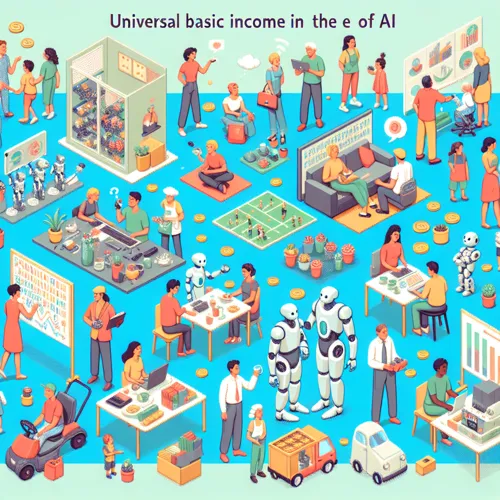UBI and AI
As Artificial Intelligence (AI) technology rapidly advances, society is grappling with the implications it may have on employment and economic structures. Universal Basic Income (UBI), a policy that provides every individual an unconditional income, has emerged as one potential solution to alleviate adverse effects brought about by AI automation. This blog post explores the relationship between UBI and jobs in the age of AI and its far-reaching consequences on society.
The Role of Automation and Job Losses
With AI systems increasingly capable of replacing human workers, fears surrounding mass job displacement are growing. From self-checkout machines in grocery stores to autonomous vehicles, it’s clear that technological advances pose a risk to certain occupations. UBI may serve as a safety net for individuals whose jobs become obsolete, offering economic stability during periods of transition as new career opportunities arise.
The widespread adoption of AI in industries like manufacturing and transport could render many current jobs redundant. However, automation may also lead to the creation of entirely new roles - for example, the development and maintenance of AI systems requires skilled workers who understand complex technologies.
To mitigate negative societal impacts caused by job displacement due to AI, UBI can provide an essential income supplement while individuals adapt to changing employment landscapes through training or retraining programs. By reducing economic insecurity during this transitional period, UBI ensures workers are more likely to invest in the requisite education and skills development required for the evolving job market.
Furthermore, UBI may act as an incentive for people to pursue entrepreneurial endeavors or engage in work that offers fulfillment but might not offer substantial income, which could contribute to a more creative and robust society.
Economic Stability and Consumer Spending
By ensuring citizens receive an unconditional basic income, UBI serves as a safety net, preventing the fall into poverty for those affected by AI-driven automation. This financial security fosters a healthier economy by increasing consumer spending power and promoting economic stability.
As people feel more secure with their basic needs met, they will likely consume more goods and services - a boost for businesses that in turn stimulates the overall economy. By bolstering demand for products and services, UBI could help mitigate potential economic contractions caused by automation and job losses.
Additionally, studies have shown that people living under the poverty line tend to spend more money proportionally than those in higher-income brackets. This means that UBI recipients would be likely to put their funds back into the economy, further enhancing its stability.
Promoting Social Equity and Redistribution of Wealth
As AI technology advances, concerns surrounding income inequality and the concentration of wealth in a smaller group grow more pressing. A UBI system can help redistribute resources among society, promoting equity by providing a base level of financial support to all citizens, regardless of their employment status or wages.
In the age of AI-powered automation, the growing gap between “haves” and “have-nots” must be addressed urgently if societies hope to maintain social harmony. By introducing UBI as a mechanism to counter this imbalance, policymakers could create a more balanced distribution of wealth.
Additionally, by reducing financial insecurity for individuals affected by job losses, UBI might promote greater social cohesion and civic engagement - something that can be threatened by increased socioeconomic disparities.
Conclusion
As the age of AI revolutionizes various industries, concerns over jobs and society are paramount. A well-designed UBI policy could potentially alleviate some of these apprehensions. By acting as a safety net for job displacement, contributing to economic stability, and promoting social equity, Universal Basic Income holds potential to mitigate adverse impacts of AI on society, ultimately setting the stage for more successful adaptation to technological advancements
